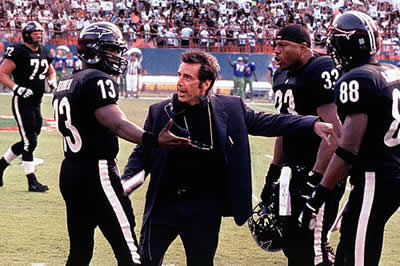


Oliver Stone's ambitious "Any Given Sunday" attempts to be two things at
once: a detailed expose on the corporate mentality of modern day pro
football, and a traditional rah-rah sports flick. It's long-winded, epic
in length, and given to the director's own self-indulgent style.
It's also surprisingly entertaining.
 Stone has said that he envisioned the project as sort of the "Dirty Dozen"
of football films, and for much of its running time, the movie succeeds on
the strengths of its high-powered performances and the interplay between
players, coaches, management and outside influences.
Stone has said that he envisioned the project as sort of the "Dirty Dozen"
of football films, and for much of its running time, the movie succeeds on
the strengths of its high-powered performances and the interplay between
players, coaches, management and outside influences.
The director casts a cynical eye on the issues surrounding the game --
money, women, dog-eat-dog management, free agency, questionable sports
medicine, and the loss of time-honored sports values. But Stone also gives
in to his old-fashioned love of the game, especially during the climactic
finale, a playoff game showcasing the movie's heroic home team, the Miami
Sharks.
Al Pacino plays Sharks head coach Tony D'Amato, a winning combination of
Vince Lombardi ethos and typical Pacino furor. In an extended opening-game
sequence that puts the viewer ground level with the players, Tony leads
the charge as his team tries to turn around a three-game losing streak.
Things go from bad to worse when veteran star quarterback Cap Rooney
(Dennis Quaid) and his backup suffer sidelining injuries, captured by
Stone and cinematographer Salvatore Totino in bone-crunching detail.
The third-string hero is Willie Beaman (Jamie Foxx), a five-year bench
warmer who shows promise when he's not throwing up from first-game
jitters. Over the course of a few victories, Willie becomes a rising star,
as does his ego.
Various subplots revolve around Beaman's ascendancy to the starting
line-up. Foremost is the ongoing battle between the traditional head coach
and new owner Christina Pagniacci (venomous Cameron Diaz). She's the
daughter of the late, former owner, who eschews her father's team-friendly
attitude with a more direct, win-at-all-costs approach.
Shouting matches between Pacino and Diaz (and there are a lot of them)
bristle with an amusing, intelligent fervor. In our modern sports world,
where winning and gratification are nearly taken for granted, Stone and
screenwriter John Logan ask some valid questions. What is the balance
between tradition and change? What is the price of winning? What should
athletes be allowed to do to pursue their dreams?
One of the strengths of the film is its depiction of the relationship
between coaches and players. Pacino and Foxx share a credible chemistry,
and the script allows their characters to question each other's motives.
The coach values how the game is played as well as the ultimate outcome,
but he still needs a star quarterback to win. The athlete does his job,
but he knows his time is limited, and the game is his means of making a
living.
As usual, Stone masterfully weaves several layers and narratives together
into a cohesive whole. But the overall project, which also features the
requisite number of exciting gridiron matches, would have been more
powerful if it were more tightly edited. Since the ending gravitates
toward the sentimental (after all, it's a sports movie), the three-hour
length comes across as excessive rather than necessary.
More problematic is Stone's form of storytelling. In "Natural Born
Killers," "U-Turn" and this project, the director opts for extreme
filmmaking which favors various speeds of filming, rapid editing,
different film stocks, multiple angles and other cinematic tricks. Done
tastefully, these devices represent everything that distinguishes film
from any other art form.
Here, they collide and blur together so often and randomly that the effect
can be distracting. Stone intends to catapult audiences right into the
middle of the action, and the movie does capture the haphazard,
smash-mouth feeling of football. But Stone shows no restraint over his
camera, which doesn't entirely lend itself to the game. There is a certain
structure and code on the gridiron. As frenetic as it can be, there's a
method. One has to be able to hear, see and understand the plays,
something not always accomplished in "Any Given Sunday."
The film credibly manages to include several important themes about sports
and its relationship to modern life, and features standout performances
from Pacino, Diaz, Foxx and especially controversial, real-life football
giant Lawrence Taylor. Taylor's passion and energy for the game comes
through in every scene he's in, and it's a pleasure to watch. He's a good
symbol for the film, which should appeal to football fans and anyone who
wonders what all the hubbub is about.

